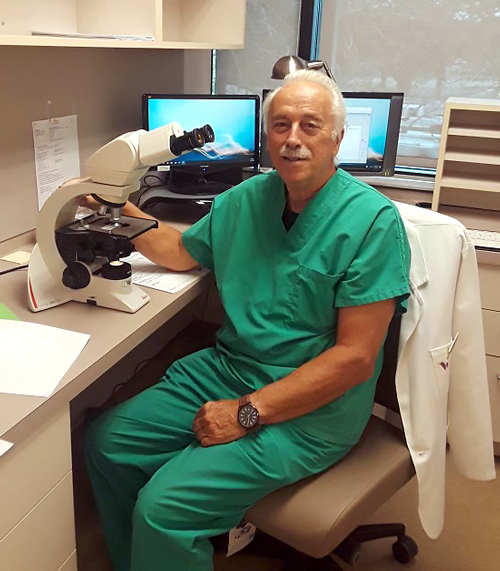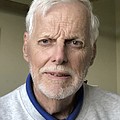Notable Neighbors
August 2, 2023 at 2:05 p.m.
 Linwood Beverly
Linwood BeverlyWilliam Wordsworth, poet laureate under Queen Victoria, observed wisely that “the child is father of the man,” and that dictum can be readily supported in the life story of Linwood Ashby Beverly, Jr. (That’s admittedly a highfalutin moniker to carry around with you all day, and Linwood Ashby Beverly, Jr. prefers to be called “Lin” by friends and family alike. “Heck,” he says, “I’m not sure where those names came from in the first place. There’s no history of them among our ancestors.”)
Lin is one of a dwindling list of members of the “Greatest Generation” – those born before or during World War II – and his namesake father was a hero of that war, who was aboard the destroyer USS Reid in Pearl Harbor when the Japanese bombed it in 1941. Having survived that, he went on to spend 27 years in the U.S. Navy, serving as a diesel engineer on a number of submarines that saw duty in the Cuban Bay of Pigs, the Philippines and Vietnam, among other strategic sites. After his death on June 27, 2000 his ashes were buried at sea aboard the nuclear submarine USS Miami.
‘I was a Navy brat,” Lin says. “We moved around a lot, but we lived in a U.S. Navy housing project in Groton, Connecticut for most of the time while my father was abroad. We didn’t have any money, but we kids had plenty to do in the project. We played cowboys and Indians, had rock fights with garbage can lids as shields, built tree huts, played marbles and read comic books. My father brought back items from various countries he visited – mostly coins and trinkets. On one visit home he put up bales of hay in our back yard for archery targets, and he put up a basketball hoop on a pole.” Life was fun, but school wasn’t. “I’d look out the window and dream of building my tree house. I had little attention for anything in the classroom,” he admits.
But at about age 12, Lin received a gift from his parents that would shape the contours of the life he was to lead. “They bought me an A.C. Gilbert chemistry set, with a microscope,” he says. “I loved it! I looked at everything under that microscope. I would even open the back door to catch snowflakes and rush back to see them under my microscope before they melted. When I went in for a medical checkup at the Naval hospital, I asked if I could get samples of my blood to look at under my microscope.” That scope opened up a whole new world of what was previously unseen. “I knew then and there that I wanted to work one day in a laboratory with chemicals and microscopes.”
The chemistry set, too, played a role in his life. He learned how to make gunpowder, and he’d pull strands from his chenille bedspread to use as wicks for firecrackers. Explosives fascinated him, but they cost him the hearing in his right ear when he made a big one that went off way too close to his head. Nonetheless, he retained a lifelong interest in rockets and guns and things that go boom. But that’s another story.
His family’s itinerant existence in relocating to wherever Dad was stationed stateside meant that Lin attended four different high schools in his teens. He finally graduated from one of them, Norview High School in Norfolk, Va., in 1961 and enrolled in what is now Old Dominion University. He spent four years at Old Dominion, earning a scholarship as the college’s radio announcer and majoring in biological science, though he didn’t finish the program. “My parents were going to move again, back to New England, and I didn’t want to do that,” he says. “I was dating a local girl, I didn’t like the cold winters up north, and I was having too much fun in Virginia.” His parents went to Rhode Island. He stayed in Norfolk at Old Dominion U., living at the Pi Kappa Phi fraternity house. “It was just like the movie ‘Animal House,’ ” he says, “and I was a party boy. I didn’t pay much attention to my classroom work. The fact that he served as president of “Animal House” might be a small affirmation of that fact. But that’s another story, he’ll tell you.
Of course, one cannot sow one’s wild oats forever. In 1966 the Vietnam war was heating up, and Lin decided he’d apply for the U.S. Army Medical Corps rather than get drafted into the regular Army. “I went to the induction center, and there must have been 5,000 other guys getting their physicals,” he recalls. Lin flunked his exam when it was discovered that he had a heart murmur, and he chortles, “There were 5,000 guys who would have gladly changed places with me.”
He no sooner got back to school when his mom June called him and said she’d just read about a government program sponsored by the American Society for Clinical Pathology that would pay the tuition for getting trained in medical technology for applicants who qualified. Lin applied, was accepted and promptly moved up to Providence, R.I. in the chilly north he so disliked, leaving his girlfriend, “Animal House” and partying days behind.
After completing the program at Our Lady of Fatima Hospital in North Providence and becoming a licensed clinical pathologist, Lin decided to move to … (drum roll) … Boston, not the warm and friendly south. Why? “I’d never been to Boston, and I went from hospitals to private labs to whatever,” he avers. “I started at Beth Israel, one of the best hospitals in the country at that time, and then to Mass General,” which also had a great reputation. “I was in the big time. Then I got married to wife number one, a Boston debutante, but that’s another story. I became the supervisor of a private laboratory and went on to spend 50 years in clinical pathology, specializing in cancer detection.” He was a whiz at it, scanning thousands of cells from all parts of the human body every day and able to identify aberrations in cellular structure accurately and quickly – literally a life-saving talent for many patients during his career. His colleagues gave him the nickname, “Dr. Papsmear,” and he sometimes wears that nametag on his lab coat.
In 1984, through a singles magazine (there was no internet dating service at that time), Lin met wife number two, Suzanne, a native of Budapest whose family came to the U.S. during the Hungarian Revolution in 1956. He had written a short bio for the magazine, and Suzanne, a recent widow, happened to peruse the magazine with three married friends. “All three of them told her she should get in touch with me,” he says, “so she did. We met, and it didn’t go well at all. I flirted with the waitress (how cool was that?), and she didn’t like that. We decided we didn’t want to get married. We each already had our own home, she had two kids of her own, I had no children, and we were pretty set in our own ways.” Three months later they got married, and next year they’ll celebrate their 40th anniversary. Guess you could say that they worked things out.
Lin and Suzanne came to Englewood in 2008 and bought a lot in South Cove, a huge development off of Gasparilla Road. In 2017 they sold the first lot, bought a second lot there, and moved in. Lin will be an octogenarian later this year, but he keeps busy rather than just resting his weary bones. He’s a professional coin and collectibles dealer, thanks to his childhood start in coin and stamp collecting. He likes boating, tennis, bowling, fishing, rifle and pistol shooting and cars – especially Corvettes, which were a passion of his during his R-rated years.
And he’s also a sought-after karaoke singer who’s performed at various public events locally and elsewhere … but that’s another story.
Dean wants to hear about the lives of intriguing individuals within our community so that he can share their story here. If you know someone with a fascinating background, let us know! Please send an email to [email protected], providing the person's name, contact information, and a description of their remarkable life story. Your contribution will help us showcase the richness and diversity of our community's experiences.
